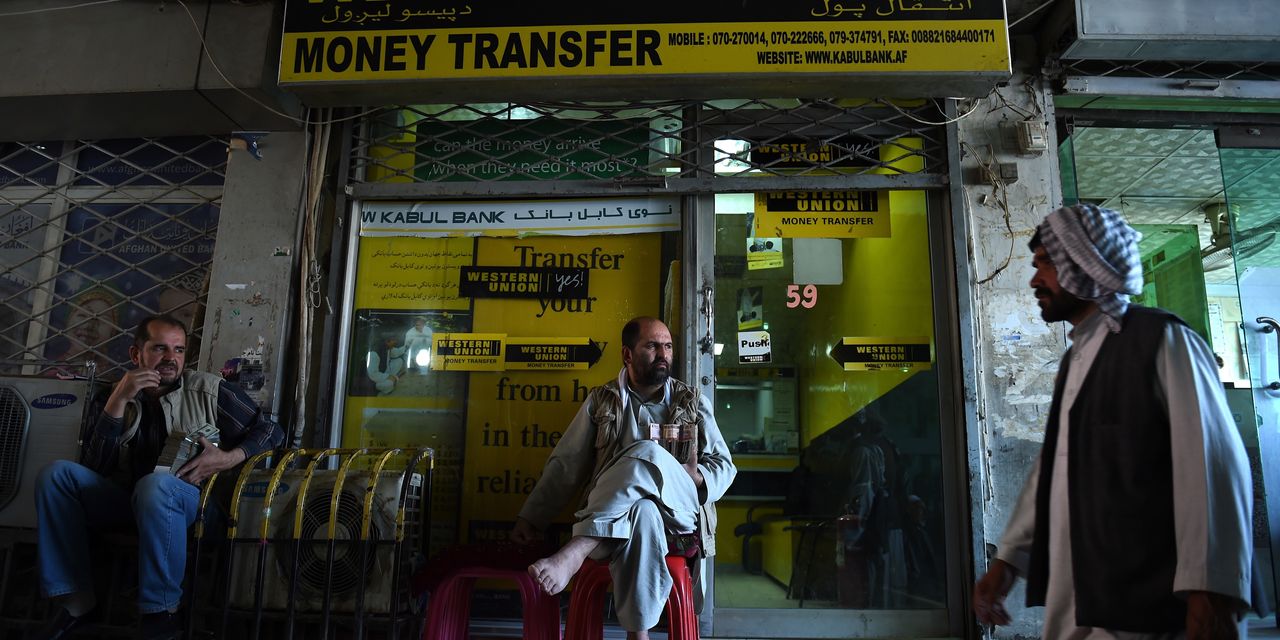
Western Union is suspending money transfers into Afghanistan as America withdraws troops from the troubled country now in the Taliban’s control.
“We recognize that our services provide a vital channel for our customers to support their loved ones, and we will continue to closely monitor this rapidly-developing situation and keep our customers and associates apprised of any developments,” the company said in a statement.
Western Union WU, -0.40%, which has the capacity to wire money from the U.S. to more than 200 countries and territories, said the perilous situation left it with no choice but to temporarily halt money transfers into Afghanistan, effective Aug. 16.
The widely-seen footage of Afghans clinging to a U.S. military plane as it took off from Kabul airport was a stark image marking the close of 20 years of American intervention in the country. But the Western Union announcement is a reminder of the less-visible assistance Afghan families have been receiving via informal financial channels from family and friends abroad.
Remittances — money beamed from abroad to people inside Afghanistan — constituted nearly 4% of the country’s gross domestic product last year, according to World Bank data. Last year, Afghanistan’s GDP was $19.8 billion, the World Bank said.
The countries where remittances made pup the largest share of GDP in 2020 were Somalia (35.2% of a $4.9 billion economy), the Kyrgyz Republic (28.4% of a $7.7 billion economy) and Tajikistan (26.6% of an $8.1 billion economy), World Bank data show.
People in Afghanistan received $788.9 million last year in remittances, the World Bank said.
Western Union and MoneyGram are the two big money transfer companies in most countries, according to Paul Vaaler, a professor at the University of Minnesota’s Carlson School of Management.
People living in urban areas like Kabul will be the ones feeling Western Union’s absence, said Vaaler, who has been studying the effects of remittances on the developing world, including Afghanistan.
MoneyGram did not respond to a request for comment on the status of its Afghanistan operations.
In rural areas, however, the informal hawala money transfer network found in Muslim-majority countries will continue on, Vaaler said.
Hawala, “transfer” in Arabic but with added references of “trust” in Hindi and Urdu, is a centuries-old, informal money transfer system to get money from one place to another, with a commission layered in. Because the network is based on trust and connections, the hawala dealers, or hawaladars, offering their services to move the currency, usually share ethnic ties with the customers they serve, Vaaler said.
Hawala is “used around the world to conduct legitimate remittances. Like any other remittance system, hawala can, and does, play a role in money laundering,” said the authors of a Treasury Department Financial Crimes Enforcement Network/INTERPOL report.
In the big picture, remittances accounting for approximately 4% GDP may not sound like a significant number, but anything helps in the war-torn country.
Afghanistan has a population of 37.4 million people and 54.5% live in poverty, according to the CIA’s World Factbook. (The poverty estimates are from 2016, the CIA notes.)
When it comes to the hawala networks, Vaaler said “that money is incredibly important. It’s literally the lifeblood of the rural economy.” For him, the big open question is what happens next for the hawala networks. However, he noted, “those groups, they know how to work with or avoid the Taliban.”
Western Union shares are up 1.6% year to date. The S&P SPX, -0.71% is up more than 18% and Dow Jones Industrial Average DJIA, -0.79% is up more than 15% in that same time.










Add Comment